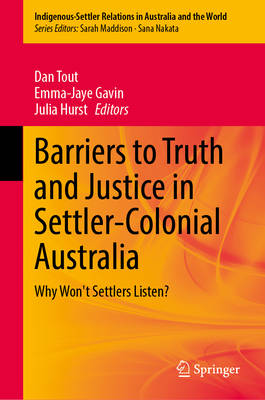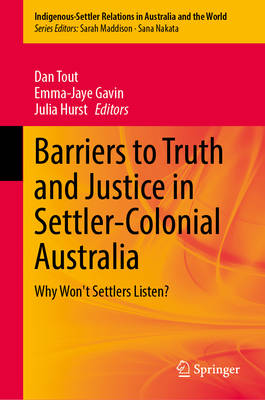
Bedankt voor het vertrouwen het afgelopen jaar! Om jou te bedanken bieden we GRATIS verzending (in België) aan op alles gedurende de hele maand januari.
- Afhalen na 1 uur in een winkel met voorraad
- In januari gratis thuislevering in België
- Ruim aanbod met 7 miljoen producten
Bedankt voor het vertrouwen het afgelopen jaar! Om jou te bedanken bieden we GRATIS verzending (in België) aan op alles gedurende de hele maand januari.
- Afhalen na 1 uur in een winkel met voorraad
- In januari gratis thuislevering in België
- Ruim aanbod met 7 miljoen producten
Zoeken
Barriers to Truth and Justice in Settler-Colonial Australia
Why Won't Settlers Listen?
€ 128,45
+ 256 punten
Omschrijving
This collection brings together Indigenous and non-Indigenous scholars and experts from Australia and beyond to examine the persistent settler-colonial patterns of denial, ignorance and antipathy that continue to constrain the possibilities of truth and justice in settler-colonial societies. Written from diverse cultural and disciplinary perspectives, the chapters identify and analyse the social, cultural and political barriers to listening, hearing, and responding on the part of settlers, and the settler state/s. Prompted by the unsuccessful 2023 referendum on an Indigenous Voice to Parliament and the constitutional recognition of the First Peoples of Australia as the First Peoples of Australia, the volume reorients the discussion. Rather than returning to questions of how truth-telling might be improved or made more persuasive, it shifts the focus towards the continuing refusal of settlers (and the settler state/s) to adequately and ethically engage with the truths that have already been told. The chapters investigate patterns of denial, deflection, and structural resistance, exposing their contradictions and points of vulnerability with the express aim of contributing to their undoing. While a number of contributions paint a sobering picture of the enduring impediments to meaningful change, others--particularly those from First Nations authors--highlight the continuing, generative, healing work of truth-telling and/as activism already underway. These contributions foreground the transformative potential of Indigenous-led truth-telling practices, not only as responses to settler inaction, but as active forces for reimagining and reshaping settler-Indigenous relations.
Specificaties
Betrokkenen
- Uitgeverij:
Inhoud
- Aantal bladzijden:
- 277
- Taal:
- Engels
- Reeks:
- Reeksnummer:
- nr. 11
Eigenschappen
- Productcode (EAN):
- 9783032130785
- Verschijningsdatum:
- 9/02/2026
- Uitvoering:
- Hardcover
- Formaat:
- Genaaid
- Afmetingen:
- 155 mm x 235 mm

Alleen bij Standaard Boekhandel
+ 256 punten op je klantenkaart van Standaard Boekhandel
Beoordelingen
We publiceren alleen reviews die voldoen aan de voorwaarden voor reviews. Bekijk onze voorwaarden voor reviews.








